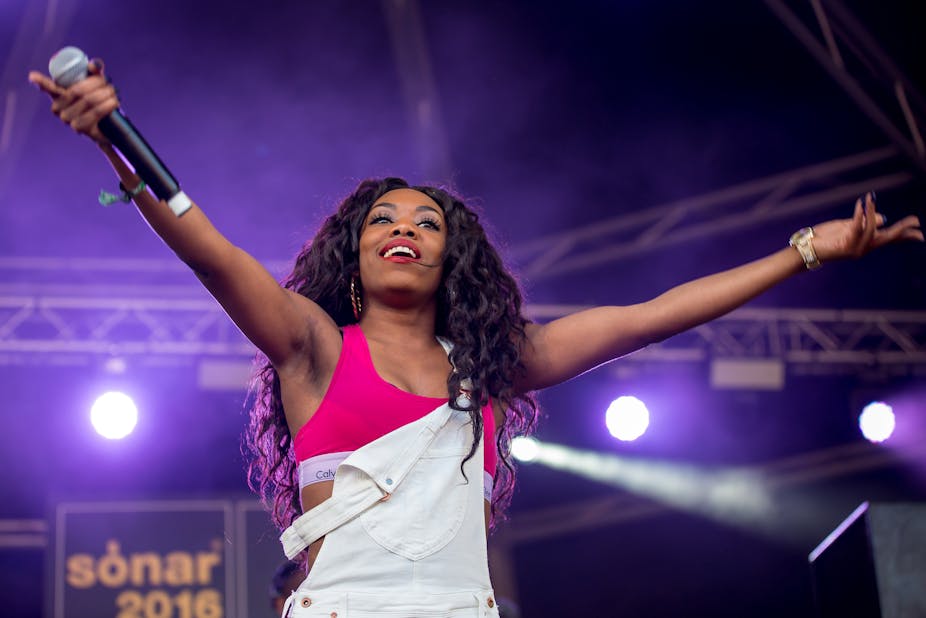With lyrics that encourage people to “keep your salivas” and “take this ting serious”, a handful of recent grime and drill releases are promoting social responsibility – instead of anti-social behaviour, as their detractors tend to argue. Both musical genres have been vilified by the authorities and media, who connect them with knife crime and gang violence.
While these civic-minded tracks are in step with the official rules of lockdown, they are also critical of the government. Many strive to cut through the ambiguity of unclear government messaging; while also holding the authorities accountable for their perceived failure to properly serve marginalised communities.
Grime and drill form part of what is considered UK “urban” music. Grime emerged from London in the early 2000s as a fusion of garage and jungle and has achieved mainstream success through artists like Skepta, Wiley and Stormzy.
Wanting to step away from grime, around 2014 young MCs looked to Chicago’s drill scene. UK drill has its roots in south-east London and has developed its own distinct British sound. It has become known for balaclava-clad rappers, council-estate scenes and violent lyrics.
Both genres were born out of a DIY entrepreneurial mindset, which has meant that MCs and producers have been quick to respond to the pandemic. These tracks frequently combine witty and relatable social observations about the hardships of isolation – like running out of snacks or having nothing to do – with public health messages in a short, sharp and entertaining format.
Wash your hands
These songs are distinctively UK-centric – “I went Sainsbury’s just to get bog roll” raps Lady Leshurr in Quarantine Speech. They record and represent the ordinary lived experience of people in Britain today – albeit in extraordinary circumstances.
Even in the more “underground” COVID tunes, the message is generally a socially responsible one. They might include lines about spending lockdown with a big bag of weed or bemoan enforced celibacy. However, listeners are encouraged to stay at home, stay safe, heed social distancing advice, and avoid spreading the disease.
In Spreadin’ drill MC Psyche pleads:
Please don’t hug me, please don’t spud me
We can make a handshake using our feet
We can make a handshake using elbows, knees
Rocking pandemic glamour in a hazmat suit and a rhinestone-studded face mask in Quarantine Speech, Lady Leshurr encourages her fans to “wash them hands”. This is both sensible public health advice and a nod to her 2015 release Queens Speech 4, which told people to “brush your teeth” – albeit this was talking about metaphorical hygiene, as in no bad-mouthing. Leshurr has also been donating profits from music and merchandise sales, which includes face masks, to the NHS, and took part in an NHS fundraiser on YouTube called Stream #WithMe.
It’s about the people
This echoing of public health instructions appears to put these artists on the same page as the authorities. This is perhaps a surprising consequence of the pandemic, given that these musical genres – Wiley’s MBE and Stormzy headlining Glastonbury notwithstanding – have continuously been subject to racial and class-based prejudice, and efforts to suppress them.
At one time, they were almost driven out of existence by the London Metropolitan Police’s notorious – and now abolished – Form 696. This identified black audiences as “high risk” and made getting club and gig licences close to impossible. These genres have also been demonised for encouraging gang culture, criticised for promoting and drug and knife crime, and even explicitly criminalised.
But rather than seeing these anti-COVID tracks as agents of mainstream propaganda, they could be seen as a response to the disproportionate impact of the virus on the communities from which these genres emerged – BAME (black and minority ethnic), working-class, urban – and a desire by artists to reach these people with public health information often more straightforward and unambiguous than government campaigns.
Read more: Coronavirus is hitting BAME communities hard on every front
These messages might be perceived as more trustworthy by their audiences, as they come directly from people like them – not politicians or journalists far removed from the daily realities of inner-city lives, chronic poverty and racism. These musicians are compensating for and criticising the government’s perceived failure to support and protect these sections of society. As Psyche says in Spreadin’:
It’s about the people
Boris is a joke, he won’t close schools
The government’s evil
These COVID-19 tracks can be seen as part of ongoing criticism by UK urban artists of the government’s perceived inability or unwillingness to tackle inequality and its effects. They are in line with Stormzy calling out Theresa May’s handling of the Grenfell Tower tragedy and its aftermath at the Brit awards in 2018.
Grime and allied genres continue to function as a vital voice for segments of society often denied access to the conventional institutions of power and public debate. Long regarded as “problem” music, they might well be part of the solution to tackling the coronavirus.

